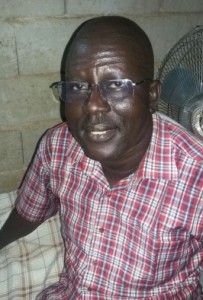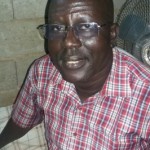JUBA, South Sudan (Morning Star News) – Attorneys for two South Sudanese pastors facing the death penalty made their closing arguments on Thursday (July 23) before a judge who appears to favor the prosecution, sources said.
Defense lawyers concluded their case at Khartoum Bahri Court with the assertion that agents from the National Intelligence and Security Services (NISS) illegally arrested the Rev. Yat Michael on Dec. 14, 2014 and the Rev. Peter Yein Reith on Jan. 11.
“Justice requires that you don’t judge [arrest] simply because you doubt [suspect] them without any concrete evidence,” one lawyer said.
Michael, 49, was arrested after delivering a message of encouragement to a North Khartoum church in the face of a government-aided take-over of the congregation’s property. The 36-year-old Reith was arrested after submitting a letter from leaders of their denomination, the South Sudan Presbyterian Evangelical Church (SSPEC), inquiring about the whereabouts of Michael.
During their trial a NISS official accused the pastors of collecting information for a human rights group. The charges, including espionage and promoting hatred among or against sects, were formed months after authorities arrested them.
“The judge in the last hearing seemed to be supporting the prosecution,” said a source who requested anonymity. “The whole issue is politically motivated, and the two pastors are innocent, but the lawyers asked the judge to respect laws and the constitution and not aid NISS in violation of the constitution.”
The charge of spying (Article 53 of the Sudanese Penal Code) is punishable by death, life imprisonment or prison and confiscation of property. The charge of promoting hatred among or against sects (Article 64) is punishable by up to two years in prison.
The pastors are also charged with undermining the constitutional system (Article 50), punishable by death, life imprisonment, or imprisonment and confiscation of property; disclosure and obtaining information and official documents (Article 55), punishable by two years in prison or a fine; blasphemy/insulting religious creeds (Article 125), punishable by one year of imprisonment or a fine or no more than 40 lashes; disturbance of the public peace (Article 69), punishable by six months of prison, or a fine or no more than 20 lashes; and joint acts in execution of a criminal conspiracy (Article 21).
NISS has presented as evidence maps and other easily accessible documents taken from their confiscated laptops, as well as a NISS study guide that the pastors say was not on their computers when they were arrested. During their trial, the defense presented an IT expert who testified about how easy it would be for others to plant the documents on their computers without their knowledge, according to Middle East Concern (MEC).
A retired general also testified that the documents used as evidence against the pastors are in the public domain and are not related to military or other state secrets as the prosecution has alleged, according to MEC.
The defense attorney on Thursday told the judge that Michael did not violate Sudanese law – specifically, “insulting religious creeds” – while preaching at Khartoum Bahri Evangelical Church, as he was just carrying out his duty as a pastor.
“To urge believers to be zealous for their church is not an insult against God,” the attorney said.
The defense team asserted that the two pastors were illegally detained for a long period without trial.
“This is illegal and against the Bill of Rights called for in Sudan’s constitution,” they stated in a filing with the court.
The lawyers called on the court to respect the constitution rather than excessive powers granted to NISS to arrest and detain any person at length without trial. NISS is manned by hard-line Islamists who are given broad powers to arrest Christians, black Africans, South Sudanese and other people lowly regarded in the country that President Omar al-Bashir has pledged will be fully Arabic and Islamic.
The defense stated that the court should drop charges against the two church leaders due to a critical lack of physical evidence.
“These charges are built on sand,” they concluded in their filing.
A verdict is expected at a hearing on Aug. 5.
The Khartoum Bahri Evangelical Church that Michael had encouraged in December was the subject of government harassment, arrests and demolition of part of its worship center as Muslim investors tried to take it over. Police in North Khartoum on Dec. 2 beat and arrested 38 Christians from the church that Michael encouraged and fined most of them. They were released later that night.
On Oct. 5, 2013, Sudan’s police and security forces broke through the church fence, beat and arrested Christians in the compound and asserted parts of the property belonged to a Muslim investor accompanying them. As Muslims nearby shouted, “Allahu Akbar [God is greater],” plainclothes police and personnel from NISS broke onto the property aboard a truck and two Land Cruisers. After beating several Christians who were in the compound, they arrested some of them; they were all released later that day.
Harassment, arrests and persecution of Christians have intensified since the secession of South Sudan in July 2011, when Bashir vowed to adopt a stricter version of sharia (Islamic law) and recognize only Islamic culture and the Arabic language. The Sudanese Minister of Guidance and Endowments announced in April 2013 that no new licenses would be granted for building new churches in Sudan, citing a decrease in the South Sudanese population.
Sudan since 2012 has expelled foreign Christians and bulldozed church buildings on the pretext that they belonged to South Sudanese. Besides raiding Christian bookstores and arresting Christians, authorities threatened to kill South Sudanese Christians who do not leave or cooperate with them in their effort to find other Christians (see Morning Star News).
Sudan fought a civil war with the south Sudanese from 1983 to 2005, and in June 2011, shortly before the secession of South Sudan the following month, the government began fighting a rebel group in the Nuba Mountains that has its roots in South Sudan.
Due to its treatment of Christians and other human rights violations, Sudan has been designated a Country of Particular Concern by the U.S. State Department since 1999, and the U.S. Commission on International Religious Freedom recommended the country remain on the list in its 2015 report.
Sudan ranked sixth on Christian support organization Open Doors’ 2015 World Watch List of 50 countries where Christians face most persecution, moving up from 11th place the previous year.
If you would like to help persecuted Christians, visit https://morningstarnews.org/resources/aid-agencies/ for a list of organizations that that can orient you on how to get involved.
If you or your organization would like to help enable Morning Star News to continue raising awareness of persecuted Christians worldwide with original-content reporting, please consider collaborating at https://morningstarnews.org/donate/?
###
© 2015 Morning Star News. Articles/photos may be reprinted with credit to Morning Star News.
Morning Star News is a 501(c)(3) non-profit corporation that relies solely on contributions to offer original news reports of persecuted Christians. By providing reliable news on the suffering church, Morning Star News’ mission is to empower those in the free world to help and to encourage persecuted Christians that they are not forgotten or alone. For free subscription or to make tax-deductible donations, contact [email protected], or send check to Morning Star News, 34281 Doheny Park Rd., # 7022, Capistrano Beach, CA 92624, USA.
- The Rev. David Yein Reith. (Christian Solidarity Worldwide)



Speak Your Mind